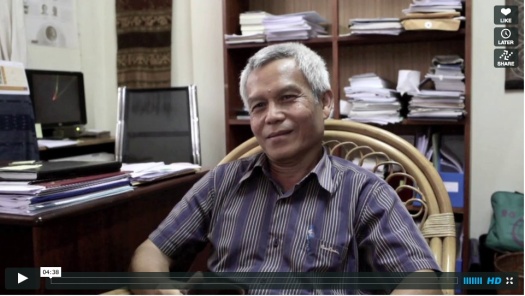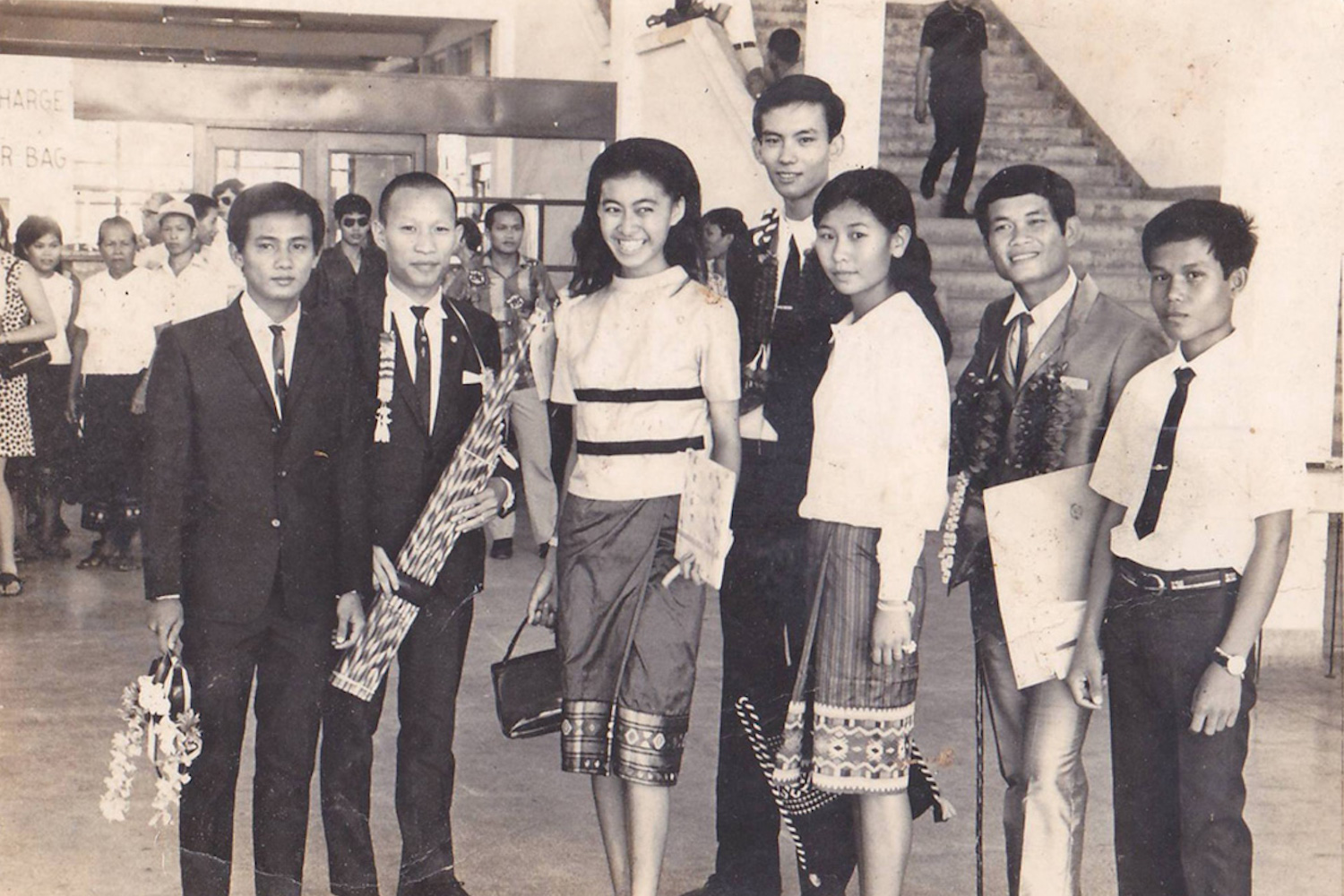Interview with Ng Shui Meng recorded at Amnesty International Australia‘s office on 27 February 2014
Disappeared Lao Civil Society Leader’s Mother ‘Still Waiting for Him to Return'
Radio Free Asia: 27 February 2014

A year and two months since prominent Lao civil society leader Sombath Somphone went missing in Vientiane, his family is still puzzled over why he disappeared and his ailing mother is still waiting for him to come home, his wife said Thursday.
“His mother is now 86 years old and ill,” Sombath’s wife Ng Shui Meng told RFA’s Lao Service Wednesday in Australia, where she spoke to students at the University of Sydney about his case.
“She is crying and waiting for her son return,” she said.
“I am asking Lao government and whoever is merciful to bring him home safely; that is my hope.”
The 61-year-old NGO leader has been missing since Dec. 15, 2012, when he was stopped in his vehicle at a police checkpoint in Vientiane. He was then transferred into another vehicle, according to police surveillance video, and no one has seen him since.
Lao officials say they are investigating the case but have offered little information on his whereabouts, prompting human rights groups to suspect that he may have been abducted by government-linked groups. Continue reading “Disappeared Lao Civil Society Leader’s Mother ‘Still Waiting for Him to Return'”
The Right to Clear Answers
If Sombath Somphone can disappear in broad daylight, it can happen to anyone. Asean governments and their stakeholders, in the name of human decency, have the right to clear answers from the Lao leadership.
In Bangkok Post article “The Sombath crisis has implications for Asean” on 14 December 2013.
Dear Sombath…from Dorothy Guerrero
Dear Sombath,
I remember our meeting in early 2011 when we, from the International Organizing Committee of the Asia Europe People’s Forum (AEPF), first approached you about the possibility of PADTEC co-organizing the parallel event to the Asia Europe Meeting (ASEM) in 2012. You listened attentively and occasionally gave a meaningful smile as we described how it was held in previous host countries. We enumerated some highlights as well as challenges that we encountered in the previous countries. We also shared that many others had expressed their apprehension about the anticipated challenges of holding it in Vientiane.
We very frankly asked you if you thought that it was possible to organize it in Vientiane without censorship and threat, or whether some participants would be barred from Laos because of their political involvement in their home countries and the type of issues that they are working on (human rights, food sovereignty, climate change , environment, etc.). I also asked if it would be better to hold it in Thailand across from Vientiane so that it would be less problematic for civil society groups in Laos. Continue reading “Dear Sombath…from Dorothy Guerrero”
Censure, sequestri e abusi: Vientiane è il regime “più repressivo” del Sud-est asiatico
Asia News: 20 February 2014
Attivisti denunciano: “nel Paese vi è un governo dittatoriale e repressivo in tema di libertà individuali e diritti civili”. La sparizione di Sombath Somphone un monito per tutti gli attivisti e oppositori al regime. Un laotiano conferma: non si può discutere di politica o criticare il partito comunista al potere. Anche la religione sotto lo stretto controllo dello Stato.
V ientiane (AsiaNews) – Il partito unico comunista al potere a Vientiane perpetra “gravi” violazioni ai diritti umani, che il più delle volte passano sotto silenzio a causa del controllo strettissimo del governo sulla stampa e le associazioni attiviste. È quanto denunciano gruppi pro-diritti umani all’indomani della pubblicazione di un rapporto secondo cui il Laos è “lo Stato più repressivo” di tutta la regione del Sud-est asiatico. Fin dalla scomparsa dell’attivista e figura di primo piano della società civile Sombath Somphone, fermato il 15 dicembre 2012 a un check-point della polizia, il Paese è finito nel mirino dei movimenti internazionali che si battono per i diritti umani. Una sparizione dietro la quale vi sarebbero agenzie governative o membri legati ai poteri dello Stato.
ientiane (AsiaNews) – Il partito unico comunista al potere a Vientiane perpetra “gravi” violazioni ai diritti umani, che il più delle volte passano sotto silenzio a causa del controllo strettissimo del governo sulla stampa e le associazioni attiviste. È quanto denunciano gruppi pro-diritti umani all’indomani della pubblicazione di un rapporto secondo cui il Laos è “lo Stato più repressivo” di tutta la regione del Sud-est asiatico. Fin dalla scomparsa dell’attivista e figura di primo piano della società civile Sombath Somphone, fermato il 15 dicembre 2012 a un check-point della polizia, il Paese è finito nel mirino dei movimenti internazionali che si battono per i diritti umani. Una sparizione dietro la quale vi sarebbero agenzie governative o membri legati ai poteri dello Stato.
In un’intervista a Radio Free Asia (Rfa) Phil Robertson, vice-direttore per l’Asia di Human Rights Watch (Hrw), sottolinea che “la situazione in Laos è molto seria”, perché il governo di Vientiane “usa il suo potere […] per controllare le posizioni politiche nel Paese, in un modo che viola chiaramente diversi trattati internazionali sui diritti umani”. Egli parla di esecutivo “dittatoriale” e “repressivo” in tema di libertà individuali e civili. Continue reading “Censure, sequestri e abusi: Vientiane è il regime “più repressivo” del Sud-est asiatico”
Laos Human Rights Abuses 'Serious,' But Mostly Hidden From View
Radio Free Asia: 19 February 2014

The one-party Communist government of Laos is committing “serious” human rights abuses which go largely unreported due to tight political controls, rights groups say, following a report that the country has become the most repressive state in the region.
Laos has been under sharper focus by rights groups since popular civil society leader Sombath Somphone vanished after being stopped in his vehicle at a police checkpoint in the capital Vientiane on Dec. 15, 2012.
The rights groups say there have been many abuses apart from the case of Sombath, who they suspect may have been abducted by government-linked organizations
“The situation in Laos is very serious,” Phil Robertson, deputy director of the Asia division of New York-based Human Rights Watch, told RFA’s Lao Service.
“The Lao government uses its power as a one-party state to effectively control political expression in the country in a way that clearly violates various international human rights treaties.”
“It is still a very dictatorial, rights-repressing government,” Robertson said. Continue reading “Laos Human Rights Abuses 'Serious,' But Mostly Hidden From View”
Dear Sombath…from Christina McMellon
Dear Sombath,
I’m sitting writing this letter in Common Ground Cafe in Vientiane, where we have often sat together and talked about happiness. When I last left Laos at the end of October 2012 we had just finished making Happy Laos and the AEPF had been and gone. In my last week in Vientiane I thought many times about calling you to arrange to meet and say goodbye but thought that you were probably exhausted and needed some time to yourself, so instead I wrote you an email saying thank you for all your support while I was living in Laos. Now I regret not making that call.
I’m back in Laos after 14 months for a very short visit. It feels like everything and nothing has changed. I feel as if, since your disappearance, all the earth under my feet has shifted by a few degrees – not enough to be constantly noticeable but enough to frequently trip me up. I am so sad not to see you here but I see your inspiration all around me, especially in the many young people that I know who are directly or indirectly connected to PADETC. Continue reading “Dear Sombath…from Christina McMellon”
Silence over missing activist in Laos
Asia Times: 12 February 2014
By Shui Meng Ng
Thirteen months after the forced disappearance of civil society activist Sombath Somphone, the European Parliament issued a second resolution calling on the Lao government to “clarify the state of the investigation”, “to answer the many outstanding questions around [his] disappearance”, and “to seek and accept assistance from foreign forensic and law enforcement experts”.
The European Parliament reiterated its concern that ”the lack of reaction by the Lao government raises suspicions that the authorities could be involved in his abduction”. This second resolution was preceded by countless other private and public appeals from governments and their representatives around world.
Statements from international organizations, development agencies, civil society groups, and academics have also urged Lao authorities to find Sombath and return him safely to his family. Scores of reports and editorials by major international and regional news networks have added to the global chorus calling for accountability.
These myriad efforts, however, have so far failed to yield results. There is still no information of Sombath’s whereabouts, or any substantive details on the progress of the official investigation into his disappearance. Continue reading “Silence over missing activist in Laos”
On Greed and Nature
 This video is one of a series from an interview by Ore Huiying with Sombath in August, 2010.
This video is one of a series from an interview by Ore Huiying with Sombath in August, 2010.
Sulak Sivaraksa on Sombath
Seeds of Peace: Vol. 30, No. 1, January-April, 2557
Sombath Somphone
By Sulak Sivaraksa
 I came to know Sombath Somphone when he was a student in Honolulu, Hawaii. He became friends with several good Americans who were Quakers. The Quakers are members of what is collectively and officially known as The Religious Society of Friends. They dedicate their lives according to religious teachings. Like Buddhists, Quakers place great importance on having kalyanamitta and have confidence in progressive than most Buddhists. They courageously and creatively express their dissent and challenge the government and state in both speech and action.
I came to know Sombath Somphone when he was a student in Honolulu, Hawaii. He became friends with several good Americans who were Quakers. The Quakers are members of what is collectively and officially known as The Religious Society of Friends. They dedicate their lives according to religious teachings. Like Buddhists, Quakers place great importance on having kalyanamitta and have confidence in progressive than most Buddhists. They courageously and creatively express their dissent and challenge the government and state in both speech and action.
I understand that Sombath’s Quaker friends influenced him to work for social justice through nonviolence. After the victory of the Communist Party in Laos, many Laotians, especially from the upper-classes, fled the county in waves. But Sombath chose to return to Laos to work in the development of his country. Because he was deft and cautious, Sombath has had a modicum of freedom in pursuing development work. He eventually established the Participatory Development Training Center (PADETC).
PADETC collaborates with many other organizations, including monks. Sombath has maintained good working-relations with state officials at all levels. This is crucial for his work. It has also enabled him to deepen and expand his activities throughout the country. As such, in 2005 Sombath was awarded the Ramon Magsaysay Award for Community Leadership. Continue reading “Sulak Sivaraksa on Sombath”
